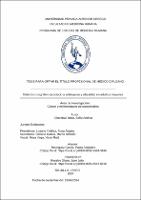Deterioro cognitivo asociado a sobrepeso y obesidad en adultos mayores
Abstract
Objetivo: Determinar si el deterioro cognitivo es un factor asociado a sobrepeso –
obesidad en pacientes adultos mayores atendidos en consultorio externo del servicio
de medicina interna del Hospital Albrecht de Trujillo durante octubre del 2023 a
noviembre del 2023.
Materiales y métodos: Este estudio fue analítico, observacional de transversal con
dirección longitudinal, donde la muestra fue de 172 pacientes que se obtendrán en
consultorio externo y cumplan los criterios de selección, tras recolectar los datos se
verificara su historia clínica para observar su índice de masa corporal y poder
catalogarlos según indica.
Resultados: Nuestro estudio tuvo 172 pacientes, de los cuales 114 tuvieron
sobrepeso-obesidad, donde el 71.1% (81) de los pacientes presentaron deterioro
cognitivo, mientras que el 28.9% (33) de pacientes no presento deterioro cognitivo,
a su vez, de los pacientes con normopeso, el 60.3% (35) de pacientes tuvieron
deterioro cognitivo y el 39.7% (23) no presentaron deterioro cognitivo. Por otro lado,
se evidencio que el sobrepeso-obesidad de los pacientes no tuvo asociación
significativa con un (p 0.157), además tiene una RP de 1.61 (IC 0.83 – 3.13).
Finalmente, la única variable interviniente asociada al deterioro cognitivo fue la edad
con un (p 0.017).
Conclusiones: El sobrepeso-obesidad no fue un factor asociado a deterioro
cognitivo en pacientes adultos mayores, la única variable interviniente asociada fue
la edad a sobrepeso-obesidad, mientras que el sexo, grado de instrucción, diabetes
mellitus e hipertensión arterial no tuvieron asociación a sobrepeso-obesidad Objective: Determine if cognitive impairment is a factor associated with overweight -
obesity in older adult patients treated in the outpatient clinic of the internal medicine
service of the Albrecht Hospital in Trujillo during October 2023 to November 2023.
Materials and methods: This study was analytical, observational, cross-sectional
with a longitudinal direction, where the sample was 172 patients who were obtained
in an outpatient clinic and met the selection criteria. After collecting the data, their
clinical history was verified to observe their body mass index and power. catalog them
as indicated.
Results: Our study had 172 patients, of which 114 were overweight-obese, where
71.1% (81) of the patients presented cognitive impairment, while 28.9% (33) of
patients did not present cognitive impairment, in turn, of the patients With normal
weight, 60.3%(35) of patients had cognitive impairment and 39.7%(23) did not
present cognitive impairment. On the other hand, it was evident that overweight obesity of the patients did not have a significant association with a (p 0.157), in
addition it has a PR of 1.61 (CI 0.83 - 3.13). Finally, the only intervening variable
associated with overweight-obesity was age with a (p 0.017).
Conclusions: Overweight-obesity was not a factor associated with cognitive
deterioration in older adult patients, the only intervening variable associated was age
with overweight-obesity, while sex, level of education, diabetes mellitus and arterial
hypertension did not have association with overweight-obesity
Subject
Collections
- Medicina Humana [3196]


